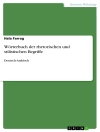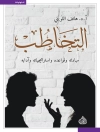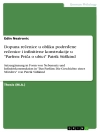This book investigates the preparation of secondary history and social studies (SS) teachers to teach English language learners (ELLs) in twenty-first century classrooms. This edited collection focuses on the ways in which pre-service and in-service teachers have developed – or may develop – instructional effectiveness for working with ELLs in the secondary history and social studies classroom. The authors address a variety of standards and content examples, including the National Council for Social Studies C3 Framework and Curriculum Standards, the Common Core State Standards for English Language Arts, and content from history, geography, and civics. This volume is part of a set of four edited books focused on teaching the key content areas to English language learners.
Table of Content
Chapter 1. Introduction; Luciana C. de Oliveira and Kathryn M. Obenchain.- Chapter 2. Developing Culturally and Linguistically Relevant Historical Thinking Skills: Lessons from U.S. History Teachers for Newcomer English Language Learners; Ashley Taylor Jaffee.- Chapter 3. Teaching History to ELLs in Standards-Based Settings: Implications for Teacher Educators; Paul Yoder and Stephanie van Hover.- Chapter 4. Using Historical Building Analysis to Support English Language Learners’ Bicultural and Historical Thinking Skills Development; Christine Baron, Christina Dobbs, and Patricia Martinez-Álvarez.- Chapter 5. Preparing Secondary Social Studies Teachers to Help English Learners Develop Academic Language and Social Studies Disciplinary Literacy; Gayle Thieman, Matthew C. Mc Parker, Elizabeth Leider, and Kent Billingham.- Chapter 6. Human Migration and Cultural Diffusion: An Inquiry Driven Project-Based Unit ; Andrea Honigsfeld, Carrie Mc Dermott, and Kelley Cordeiro.- Chapter 7. Using Socratic Circles to Engage English Language Learners in Historical Inquiry and Discussion; Hayriye Kayi-Aydar, Jason L. Endacott, and Christian Z. Goering.- Chapter 8. Simulating Language Learning Experiences in Social Studies Classrooms; Cory Wright-Maley, and Jennifer D. Green.- Chapter 9. Apprenticing Students and Teachers Into Historical Content, Language, and Thinking Through Genre Pedagogy; Laura Schall-Leckrone and Debra Barron.
About the author
Luciana C. de Oliveira is Professor and Chair of the Department of Teaching and Learning at the University of Miami, USA. Her research centres on teaching English Language Learners at the K-12 level, including the role of language in learning the content areas, second language writing, and teacher preparation for ELLs. She has edited two other Palgrave Macmillan books focused on the content areas.
Kathryn Obenchain is Associate Professor at Purdue University, USA. Her research and publications focus on democratic citizenship education in the U.S. and emerging democracies, with a particular interest in how social studies classrooms are structured to promote democratic knowledge, skills and dispositions through curricular and instructional decisions.












